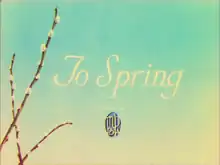| To Spring | |
|---|---|
 Title Card | |
| Directed by | William Hanna Paul Fennell (both uncredited) |
| Produced by | Hugh Harman Rudolf Ising |
| Starring | J. Donald Wilson[1] Delos Jewkes |
| Music by | Scott Bradley |
| Animation by | Paul Fennell |
| Color process | Technicolor (3-hue) |
Production companies | |
| Distributed by | Loew's Inc |
Release date |
|
Running time | 9 minutes |
| Language | English |
To Spring is a 1936 animated musical short produced by Harman and Ising for the MGM cartoon studio's Happy Harmonies series.[2] Although the production credit goes to Harman and Ising this short was actually the first cartoon to be directed by the future cartoon giant William Hanna, along with animator Paul Fennell.[3] It is one of just three MGM cartoons that are in the public domain, and the only Happy Harmonies short in the public domain.
Plot
This short begins with the melting of winter snow as little human-like creatures (either elves or gnomes) below the ground mine colorful crystals. The creatures then process the crystals into liquids that cover the main rainbow colors. This work incites the arrival of spring above on the surface. However, a snowy wind appears and causes issues that hinders the process as the creatures start working harder. In the end, the creatures prevail and spring occurs.
Production
The title is a play on words used to represent the season of spring and action the gnomes must take to wake up and get to work. Lee Blair oversaw the short's vibrant Technicolor process.[4] The short also features the directorial debut of William Hanna, who would later create Tom & Jerry. Hanna co-directed the short with Paul Fennell, but Harman and Ising retained the production credit.[4] The film is in the public domain, because its copyright was not renewed after an initial 28 year term.[5] In addition to writing the music, Scott Bradley conducted the orchestra himself, as he did for all cartoons that he scored.[4] Voice work in the short included Delos Jewkes as the snowy wind, and radio actor J. Donald Wilson voicing the main elf (gnome).[4]

See also
- Jerky Turkey (1945)
- Doggone Tired (1949)
References
- ↑ Scott, Keith (3 October 2022). Cartoon Voices of the Golden Age, 1930-70 Vol. 1. BearManor Media. p. 135. Retrieved 21 September 2022.
- ↑ Lenburg, Jeff (1999). The Encyclopedia of Animated Cartoons. Checkmark Books. p. 89. ISBN 0-8160-3831-7. Retrieved 6 June 2020.
- ↑ "Radio Swiss Jazz - Music database - Musician". Retrieved 2023-02-20.
- 1 2 3 4 Scott, Keith (2022). Cartoon Voices of the Golden Age, 1930-70 Vol. 1. BearManor Media. pp. Chapter 2. ISBN 979-8887710099.
- ↑ "Public Domain Cartoons" (PDF). Retrieved February 21, 2023.
External links
- To Spring at the Internet Movie Database